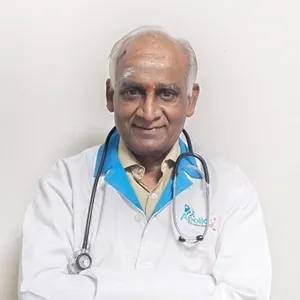Services
Heart Attack
A heart attack can be one of the scariest medical conditions that can affect a person. This event occurs when the flow of oxygen-rich blood suddenly becomes blocked to a section of the heart muscle. This blockage results in the heart not getting the required oxygen. This can be dangerous, because the section of the heart to which the blood flow has been interrupted begins to die.
Symptoms Of A Heart Attack-
While heart attack symptoms may vary from case to case, the common signs that you may be suffering from a heart attack include:
- Discomfort, pressure, heaviness or pain in the chest, arm, or from below the breastbone.
- Discomfort or pain that is radiating towards your back, your jaw, your throat or the arm.
- An excessive sense of fullness, indigestion or a feeling of choking, which may feel like signs of heartburn.
- Excessive sweating, nausea, anxiety or shortness of breath
- Rapid or irregular heartbeats.
It should be noted that heart attack symptoms may last for 30 minutes or more. In certain cases, a person may suffer from a heart attack that does not display any symptoms at all. This kind of a heart attack, known as a silent myocardial infarction can occur with anyone, but is prevalent more in cases where the patient is also suffering from diabetes.
Causes Of A Heart Attack-
There are a number of heart attack causes that have been flagged as potential factors that can increase heart attack risk. These can include:
- Age: Heart attack risk increase when a man crosses the age of 45 years, and for a woman when she crosses the age of 55 years.
- Angina: This condition results in the heart not receiving enough oxygen, which causes chest pain that can resemble a heart attack, but can be resolved after taking medication. This condition, however, increases the risk of the patient suffering from a heart attack.
- High Levels of Blood Cholesterol: This condition can increase the risk of developing blood clots in your arteries.
- Diabetes- Patients suffering from this condition run a higher risk of suffering from a number of diseases and conditions, which in turn leave them at a higher risk of heart attack.
- Diet: People who follow a persistent and unhealthy form of diet, which has a large quantity of saturated fats, for example, may be at a higher risk of suffering from a heart attack.
- Genetic History: Patients who have a family history of heart attacks may be at a higher risk of suffering from one themselves.
- Hypertension - Patients who are suffering from high blood pressure also run the risk of suffering from a heart attack.
- Heart Surgery: People who have a medical history of heart surgery are also at a higher heart attack risk.
- Physical Inactivity or Obesity: People who are suffering either from obesity or are relatively less active physically may also be at risk of suffering from a heart attack.
- Work Stress: Excessively stressful jobs, or jobs that focus on shift work, can also be a heart attack cause.
Treating A Heart Attack-
Speed is of the essence for heart attack treatment. While the majority of heart attacks can be treated effectively, it is crucial to understand that the patient's survival is dependent on how quickly they can be taken to a hospital. Heart attack treatment can be bifurcated into two sections. These are:
Treatment During A Heart Attack:
Cardio-Pulmonary Resuscitation (CPR)-
In some heart attack cases, patients stop breathing, or do not move or respond when spoken to or touched. In other cases, they may also be found coughing during the attack. In such cases, it is essential that CPR procedure begin immediately. It should be noted that this form of treatment should be administered by a medical professional, or a trained specialist, and will include:
- Manual Chest Compression - This involves continuous chest compressions to the heart, at the rate of approximately 100 beats per minute.
- Defibrillator - A defibrillator sends out electrical shocks across the patient's chest, with the aim to use electricity to shock the heart back into proper activity.
- Antiplatelet medicine like Aspirin- This medication is often given to patients suffering from a heart attack. Antiplatelet medication can help stop the clot in the artery, which may be a heart attack cause, from growing.
- Thrombolytics- This form of medication can help to dissolve blood clots.
- Painkillers- Painkillers may sometimes be administered during a heart attack, to help control the pain and reduce anxiety.
Treatment After A Heart Attack-
After suffering from a heart attack, a patient will need to follow a course, which may involve a number of medicines. In certain cases, a patient may even be required to undergo certain procedures. Both forms of treatment aim to prevent another heart attack from occurring.
This will include:
- Antiplatelet Medicine Like Aspirin- This form of medication lowers the chances of blood clotting.
- Beta-Blockers - This form of medication will make the heart beat slower, and with less force.
- Angiotensin-Converting Enzyme Inhibitors- This form of medication will help to ease the working of your heart by opening up the blood vessels and lowering blood pressure.
- Statins: This form of medication helps to lower blood cholesterol levels.
Medical Procedures- In cases where the patient's heart has been severely damaged, a surgical procedure may be needed. Two of the most commonly performed surgical procedures include:
Angioplasty- This procedure is used to open up the coronary artery, using a small wire, which is inserted into the coronary artery until it reaches the clot. A small balloon at the end of the wire is placed at the narrowest part of the artery, and inflating, effectively squashing the clot. To keep the artery open, a flexible metal mesh, called a stent is then placed there.
Coronary Artery Bypass Graft (CABG)- Grafts taken from blood vessels present in other parts of the body are used to bypass the damaged blood vessel. This bypass effectively goes around the blocked part of the artery, which then allows the blood to pass into the heart muscle.
Apollo Clinic Experience-
At Apollo Clinic, our team of world-class cardiologists, intensivists and trained nursing staff are prepared to offer you timely intervention and support to help safeguard your life. With advanced Cath labs and operation rooms, as well as an efficient Critical Care Unit, our team of experts have consistently maintained high success rates while dealing with heart attack patients. If you feel the onset of heart attack symptoms or know someone who is, immediately come in to one of our centres for support and care.














.jpg)









